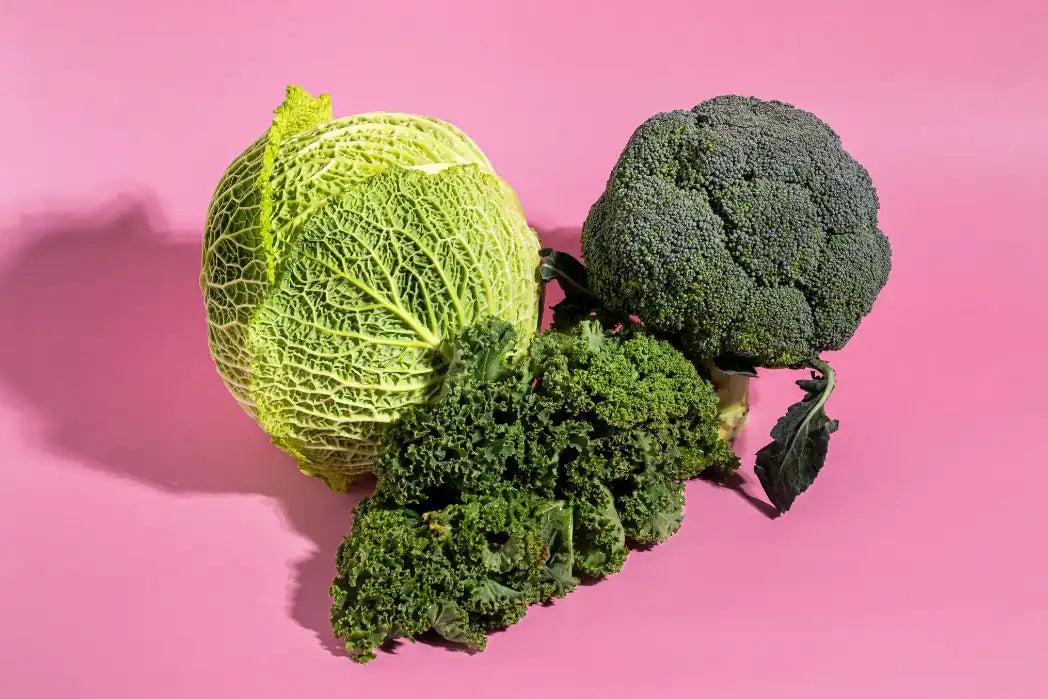Why Broccoli Sprouts Deserve a Place in Your Kitchen ›
- Broccoli sprouts are tiny powerhouses of nutrition—young broccoli plants just a few days old.
- They are packed with sulforaphane, a compound known for potential health benefits.
- Growing them at home is simple and cost-effective. You only need a jar or tray — our Glass Sprouter makes it easy, or grab the Broccoli Sprout Grow Kit. Rinsing regularly is key to freshness.
- Rich in vitamins A, C, and K, plus fibre and antioxidants.
- Can be eaten raw or lightly cooked. Stored properly in the fridge, they last up to a week.
- Support digestion and immune function when part of a balanced diet.
What Are Broccoli Sprouts? ›
Broccoli sprouts are the young shoots of the broccoli plant, typically harvested after 3–5 days. They resemble alfalfa sprouts but with a spicier flavour.
Unlike mature broccoli, these sprouts deliver concentrated sulforaphane and antioxidants.

Fresh broccoli sprouts — easy to grow at home with a jar or sprouter.
Broccoli Sprouts Nutrition Facts ›
- High in vitamins A, C, and K
- Rich in iron, calcium, and potassium
- Good source of fibre
Why Broccoli Sprouts Are Studied for Anti-Carcinogenic Support
Sulforaphane—formed when sprouts are chewed, chopped, or blended—has been widely researched for its potential to help the body defend against carcinogens. Research suggests sulforaphane may:
- Activate phase II detox enzymes (e.g., NQO1, GST) that help neutralise carcinogens before DNA damage occurs.
- Boost antioxidant defences via Nrf2 signalling, reducing oxidative stress.
- Modulate inflammation pathways implicated in chronic disease and cancer development.
Clinical Interest
Broccoli sprouts are under active investigation. For example, a Johns Hopkins clinical trial is studying broccoli sprout extract and breast tissue health, reflecting strong scientific interest in sulforaphane’s potential role in cancer prevention.
How to Maximise Sulforaphane
- Chew well or blend sprouts to bring myrosinase into contact with glucoraphanin.
- Serve raw or lightly warmed (avoid high heat/long cook times that inactivate myrosinase).
- Optional hack: a pinch of mustard powder (myrosinase source) can help if sprouts were heated.
- Store properly: keep dry and refrigerated; enjoy within ~7 days for best flavour and nutrition.
Next Steps
- See our growing guide for how to grow broccoli sprouts step-by-step instructions.
- Start sprouting with Broccoli Sprouting Seeds or the Broccoli Sprout Grow Kit.

Key micronutrients found in broccoli sprouts.
Health Benefits of Broccoli Sprouts ›
Eating broccoli sprouts regularly may offer powerful protective benefits. Thanks to their exceptionally high levels of sulforaphane, these sprouts don’t just support everyday wellness—they’re also being actively researched for their potential anti-carcinogenic effects. Studies suggest sulforaphane can activate detox enzymes that neutralise carcinogens, reduce inflammation, and even influence genes linked to cancer protection.
- Immune Defence: Enhances the body’s natural ability to fight off infections and cellular damage.
- Liver Detox: Activates key phase II enzymes that help flush out toxins and pollutants.
- Heart Health: Assists with cholesterol balance and supports healthy blood vessels.
- Digestive Wellness: Provides fibre and plant compounds that nourish gut bacteria and promote smoother digestion.
- Anti-Carcinogenic Potential: Sulforaphane is being studied for its ability to slow cancer cell growth, protect DNA from damage, and reduce overall cancer risk.
Broccoli Sprouts vs. Mature Broccoli ›
- Sprouts = higher sulforaphane
- Mature broccoli = more fibre
- Both provide essential vitamins

Sprouts and florets complement each other nutritionally.
How to Grow Broccoli Sprouts at Home ›
Start with high-quality Broccoli Seeds, a jar, and clean water. Or choose from our Sprouting Kits & Equipment.
For the easiest start, grab our Broccoli Sprout Grow Kit (2 jars + 1kg of seeds for $69.90). Prefer a sleek look? Our Glass Sprouter offers excellent drainage and airflow.
Quick Start Growing Guide
New to sprouting? View our quick guide and download a printable instruction leaflet (PDF).
Expert Insights: Dr. Rhonda Patrick ›
Want a hands-on guide? In this video, Dr. Rhonda Patrick gives a practical lesson on how to grow, store, and consume broccoli sprouts — while explaining their powerful health benefits. A must-watch if you want to get the most from your sprouts.
Inspired to try sprouting? Our Broccoli Sprout Grow Kit includes 2 sprouting jars and 1kg of premium broccoli seeds — everything you need to get started.
Step-by-Step Growing Guide ›
- Place 2 tbsp of broccoli seeds in a clean sprouting jar.
- Soak overnight, then drain thoroughly.
- Rinse 2–3 times daily, keeping the jar inverted for drainage.
- Keep in indirect light at room temperature.
- Harvest in 3–5 days when sprouts reach 1–2 inches.
Do They Need to Be in the Dark? ›
Broccoli sprouts don’t require complete darkness. Indirect light is ideal. Avoid direct sun, which can overheat the jar and cause spoilage.
- Indirect light promotes robust growth.
- Avoid direct sunlight to prevent overheating.
- A shaded countertop is ideal.
What If the Seeds Don’t Sprout? ›
If your seeds fail to sprout, check freshness, water quality, and rinsing routine.
- Seeds may be too old or stored improperly.
- Soaking/rinsing water may contain contaminants.
- Insufficient drainage can lead to poor germination.
Use fresh, sprouting-grade seeds and ensure thorough rinsing and drainage.
Harvesting & Storage ›
Once sprouts reach 1–2 inches, harvest, rinse, and dry on paper towels to remove excess moisture. Store in a sealed container in the fridge.
- Keep in a moisture-proof container.
- Refrigerate to maintain freshness.
- Label with the harvest date.
When Are They Ready to Harvest? ›
Typically 3–5 days after soaking, at 1–2 inches long.
- Vibrant green colour
- Sprout growth beyond seed size
- Fresh, clean aroma (no off odours)
How Long Do They Last? ›
When stored correctly, broccoli sprouts will keep fresh in the fridge for up to 7 days. For maximum flavour and nutrition, enjoy them within this period. You can also freeze sprouts and add them straight into smoothies for a convenient boost.
Food Safety & Using Seeds ›
Always use sprouting-grade seeds (tested for pathogens), not garden seeds that may be chemically treated.
Rinse thoroughly and keep equipment clean between batches. Filtered water is ideal for optimal sprouting.
Our Glass Sprouter is simple to sanitise between batches, and the Broccoli Grow Kit gives you fresh, lab-tested seeds plus jars at a bargain price.
Can I Use Garden Seeds? ›
Not recommended. Garden seeds may be treated with pesticides or fungicides and aren’t guaranteed safe for raw consumption.
- Possible chemical treatments
- Higher risk of contamination
- Not tested for sprouting safety
What Is a Bad Smell or Murky Water? ›
Sour odours, cloudy soak/rinse water, or sliminess indicate spoilage. Discard the batch and clean your gear thoroughly.
Common Questions & Troubleshooting ›
If sprouts fail to thrive, adjust seed freshness, rinsing frequency, drainage angle, room temperature, and airflow. Most issues respond to cleaner equipment and better drainage.
- Ensure Quality Seeds: Fresh, sprouting-grade.
- Maintain Cleanliness: Sterilise jars and lids regularly.
- Monitor Conditions: Indirect light, room temp, good airflow.
What Is the White Fuzz? ›
Usually harmless root hairs (fine, delicate), not mould. Mould appears fuzzier, spreads rapidly, and often smells musty.
- Root Hairs: Fine, vanish after rinsing.
- Mould: Persistent, fuzzy patches, off odour.
How Often Do I Rinse Them? ›
Rinse 2–3 times daily with cool water. Keep the jar inverted for drainage and airflow.
- Morning Rinse: Start fresh.
- Afternoon Check: Rinse if warm/dry.
- Evening Rinse: Prep for overnight.
Are Broccoli Sprouts Safe to Eat? ›
Generally safe for most people, but like all raw sprouts, they carry a small risk of bacterial contamination. Rinse well and use sprouting-grade seeds.
Some choose to lightly steam sprouts to reduce risk while keeping most nutrients.
- Rinse Thoroughly before eating or storing
- Use Fresh Seeds within date
- Consider Light Cooking for added safety
Should People with Compromised Immune Systems Eat Them? ›
Consult a healthcare provider before eating raw sprouts. Light steaming can reduce bacterial risk while preserving much of the nutrition.
- Consult Your Provider for personalised advice
- Consider Cooking (quick steam)
- Monitor Symptoms and discard if in doubt
How to Eat Broccoli Sprouts ›
Broccoli sprouts are incredibly versatile. Add them to everyday meals to boost nutrition.
- Salads: Mix through for crunch
- Sandwiches & Wraps
- Smoothies & Juices
- Omelettes and Avocado Toast
Should I Cook Them? ›
Optional. Lightly steaming or a quick sauté reduces bacterial risk with minimal nutrient loss. Avoid high heat and long cook times.
- Light Steam: ~1 minute
- Quick Sauté: Gentle heat
- Avoid Overcooking: Preserve benefits
Can I Eat Them Every Day? ›
Generally safe as part of a balanced diet. Variety is key — rotate with other nutritious foods and monitor how your body feels.
- Balance overall diet
- Mix Foods for variety
- Listen to Your Body
Conclusion ›
Broccoli sprouts are simple to grow and packed with health benefits. Start with Broccoli Sprouting Seeds, a Glass Sprouter, or go all-in with our Broccoli Sprout Grow Kit.

